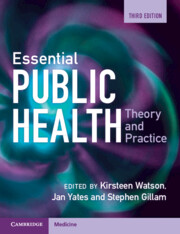Book contents
- Essential Public Health
- Essential Public Health
- Copyright page
- Contents
- Contributors
- Foreword
- Acknowledgements
- Introduction
- Part 1 The Public Health Toolkit
- 1 Health Needs Assessment
- 2 Health Information
- 3 Epidemiology
- 4 Evidence-Based Health-Care
- 5 Decision-Making and Priority Setting
- 6 Improving Quality of Care
- 7 Management, Leadership and Change
- 8 Improving Population Health
- 9 Screening
- 10 Health Protection and Communicable Disease Control
- Part 2 Contexts for Public Health Practice
- Glossary
- Index
- References
7 - Management, Leadership and Change
from Part 1 - The Public Health Toolkit
Published online by Cambridge University Press: 01 December 2023
- Essential Public Health
- Essential Public Health
- Copyright page
- Contents
- Contributors
- Foreword
- Acknowledgements
- Introduction
- Part 1 The Public Health Toolkit
- 1 Health Needs Assessment
- 2 Health Information
- 3 Epidemiology
- 4 Evidence-Based Health-Care
- 5 Decision-Making and Priority Setting
- 6 Improving Quality of Care
- 7 Management, Leadership and Change
- 8 Improving Population Health
- 9 Screening
- 10 Health Protection and Communicable Disease Control
- Part 2 Contexts for Public Health Practice
- Glossary
- Index
- References
Summary
Effective public health practice requires a combination of expertise and influence. Yet gaining expertise in the subject matter is only one element of practice: the ability to influence outcomes, policy, services and the people who make decisions is crucial. To deploy your expertise to have an impact, you must hone leadership and management skills to persuade, encourage and empower others. This chapter, therefore, aims to:
offer a brief overview of different schools of thought in leadership;
propose a simple framework of eight core domains for identifying skills and areas for professional development;
introduce some popular theories for understanding others, which can enable you to work more effectively with individuals and influence within teams and organizations; and
signpost to some key models of conceptualizing change and how to lead or manage change.
Keywords
- Type
- Chapter
- Information
- Essential Public HealthTheory and Practice, pp. 124 - 144Publisher: Cambridge University PressPrint publication year: 2023



